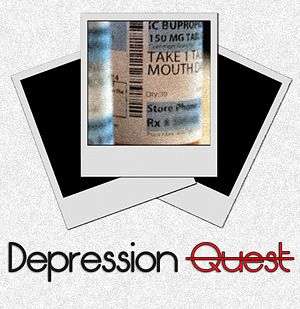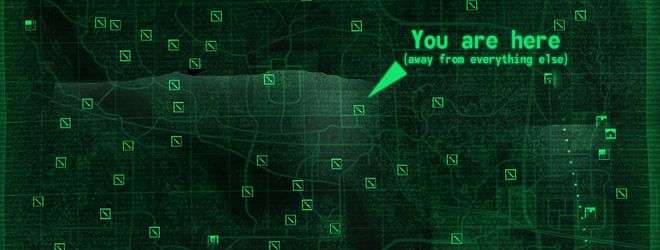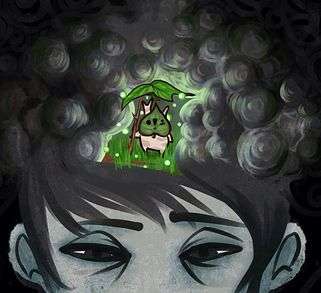“I’m Not Mentally Ill Because I’m A Gamer, But Am I A Gamer Because I’m Mentally Ill?” – by Holly Nielsen
by GL Guest Writer
 With the discussions swirling around Depression Quest and research from both the British Medical Journal and the American Psychological Association showing that gaming can alleviate symptoms of depression and anxiety while aiding therapy, I’ve been thinking a lot lately about mental health and video games. This is a topic very close to my heart as just under a year ago I was diagnosed with both clinical depression and an anxiety disorder. This led to me having to take a year out of University and missing a chance to study at the University of Chicago. Don’t worry, I’m not just going to write down all my misfortunes and cause you, dear reader, to have a depressive episode of your own; I’m telling you all of this because that year off led prompted me to write about video games, working at Ginx TV, and appearing occasionally on Sky’s Tech show Swipe, all of which have been incredibly helpful in getting my life back to normal, and have got me thinking about the role that games have played in my recovery, and whether my illness has shaped my love of gaming.
With the discussions swirling around Depression Quest and research from both the British Medical Journal and the American Psychological Association showing that gaming can alleviate symptoms of depression and anxiety while aiding therapy, I’ve been thinking a lot lately about mental health and video games. This is a topic very close to my heart as just under a year ago I was diagnosed with both clinical depression and an anxiety disorder. This led to me having to take a year out of University and missing a chance to study at the University of Chicago. Don’t worry, I’m not just going to write down all my misfortunes and cause you, dear reader, to have a depressive episode of your own; I’m telling you all of this because that year off led prompted me to write about video games, working at Ginx TV, and appearing occasionally on Sky’s Tech show Swipe, all of which have been incredibly helpful in getting my life back to normal, and have got me thinking about the role that games have played in my recovery, and whether my illness has shaped my love of gaming.
I should probably give a little bit of context – there is no tangible reason for my mental illness, and nothing has happened in my life to cause it. An unfortunate mix of genetics, chemicals mixing about in my brain, and the way my mind works seems to be the general conclusion for its appearance. Although I wasn’t formally diagnosed until just under a year ago, it’s thought that the anxiety disorder has been life-long and that the depression came along a little bit later. Looking back on my childhood, I can see that even then there was a connection between my being really anxious and video games. If I got really worked up I would spend a couple of days glued to my Game Boy or GameCube, and once I’d done that I would feel more able to cope with everyday tasks. I can’t help but feel that my favourite games have been inspired by this need for escapism; Oblivion, The Legend of Zelda, and Fallout; if they have a large world that I can lose myself in then I’m more than likely to love it.
Now don’t get me wrong, as at my lowest I couldn’t get out of bed and get dressed, let alone play hours of Monster Hunter. However, earlier this year, games played a vital role in getting me to gradually engage with things again. I’m an avid reader, but at the time I had no concentration or memory and the mere thought of a magazine – let alone a book – was terrifying. I would sometimes be propped in front of a TV but I couldn’t pay attention; I would just passively sit there. A simple videogame, however, was perfect – it wasn’t challenging and didn’t involve memory, but it also required some engagement and gradually improved my ability to focus.
 That feeling of escapism I found in gaming was necessary to getting me back on my feet; the villagers in Animal Crossing don’t look at you with sympathetic eyes, and Mario doesn’t walk on eggshells whenever you’re around. When you’re playing a game, you’re in that world and you don’t have to worry about what people are thinking, or if they know that you’re ill. However, this escapism can also just perpetuate depression or anxiety by ignoring your illness and allowing you to avoid other people and deny yourself a chance to open up, which is a vital step to recovery.
That feeling of escapism I found in gaming was necessary to getting me back on my feet; the villagers in Animal Crossing don’t look at you with sympathetic eyes, and Mario doesn’t walk on eggshells whenever you’re around. When you’re playing a game, you’re in that world and you don’t have to worry about what people are thinking, or if they know that you’re ill. However, this escapism can also just perpetuate depression or anxiety by ignoring your illness and allowing you to avoid other people and deny yourself a chance to open up, which is a vital step to recovery.
Mental illness is still a bit of a taboo subject in our society. I was told by a psychotherapist that because of my condition I should consider very carefully whether I wanted it on my medical records, as they’d had issues with people not getting jobs because of it. So, my choice was either streamlined medical care or my mental health not being made known to employers. This should never have to be a choice. The reason for all this misunderstanding is that people often struggle to see mental illness as something as real as diabetes or asthma, and to understand it is a difficult task if you haven’t experienced it.
Depression Quest is a text-based game in which you go through day-to-day tasks as someone with depression. It’s wonderfully eye-opening to the struggles people with depression face day in and day out, and has created a simple way of understanding the illness. Unlike any other art form, games have the ability to make us feel responsibility and guilt by putting us in someone else’s shoes and making their decisions. Games have the potential to show the physical difficulties of mental illness, not just the psychological ones.
Depression Quest works brilliantly and is presented in a pretty simple format. The future of gaming seems to be heading towards deeply immersive gameplay with virtual reality being a recent hot topic. At London Comic Con I had a chance to try the Oculus Rift and see a presentation by the developers of Loading Human, Untold Games CEO Flavio Parenti and designer Matteo Sosso. They made some very interesting points about how the player becomes the character by not just seeing exactly what the character sees and experiencing their world, but by also hearing the character’s thoughts. Could you imagine how moving it would be to become a character who suffers from depression, anxiety or any mental illness and listening to the pervasive thoughts that cripple them? As someone who suffers from both depression and anxiety I would love to be able to put a headset on someone so that they could get a glimpse into what it’s like. Hopefully this would eliminate questions such as “don’t they just cancel each other out?” or “maybe you’re just a bit stressed?”. Obviously something like that wouldn’t be completely the same, but seeing how eye-opening Depression Quest was to people, the opportunity to educate and raise awareness is huge. Games really do have the potential to improve dialogue about mental health.
It wasn’t just the games themselves that helped me; the gaming community and games journalism acted as a kind of comfort blanket that helped me to be able to write and socialise again. None of my friends growing up were gamers, so gaming was always something I did privately or with family. It’s only very recently that I’ve really socialised with others who play games and that’s because I’ve started writing about them. Being a gamer gave me a common ground with meeting new people – it was something I could happily talk about, knowing that I was safe within my comfort zone. I also knew I wanted to write as I found it very therapeutic, but I struggled to even put a sentence together at my lowest. Videogames were something I knew and could write about with relative ease, enabling me to slowly get my confidence back both creatively and socially. Nothing quite knocks your confidence like being completely powerless and unable to complete the simplest tasks. I’m sure there will be other people out there who can relate to this.
So, I’m not mentally ill because I’m a gamer (despite what the tabloids would have you believe) but am I a gamer because I’m mentally ill? I’m not saying all gamers have a mental illness, but I do wonder how much of my own interest in games is related to my illness. Would I have been interested in games at a young age if I didn’t need escapism? Obviously, no-one can really answer those questions. My aunt once said to me “Don’t let people pressure you into what should make you feel better; you have to find your own way of coping” and I am thankful that videogames are very much part of my own way.
If you have any issues with mental health, contact your local GP or contact Mind on:
T: 020 8519 2122
contact@mind.org.uk
Last five articles by GL Guest Writer
- Pokémon Sun and Moon - Preview
- Are The Likes Of Skylanders and Amiibo Doing More Harm Than Good?
- “I’m Not Mentally Ill Because I’m A Gamer, But Am I A Gamer Because I’m Mentally Ill?” - by Holly Nielsen
- Fanboy Loyalty or Cowardice?
- I’m Afraid You Have Consolitis






















A very interesting and thought provoking article. The title grabbed me and I found it an enjoyable read. I hope you continue to write
Excellent article. Subject close to my heart and you hit the nail on the head.
Finally an article I arrived at from N4G that is very much worth reading. You explained things far better than I’ve ever managed to.
Very interesting read. I’ve often thought about the high number of people with personality disorders and mental health issues in the world of writing. Whether it’s the solitary nature of the work that attracts them to it, or being on your own so much makes it worse.
Well done on GL for publishing this